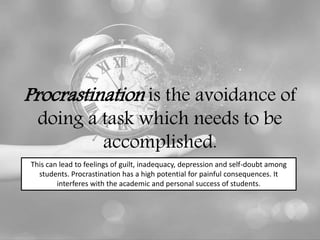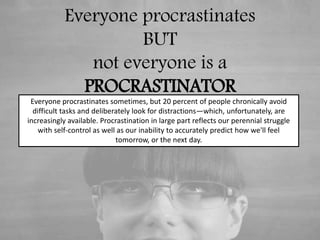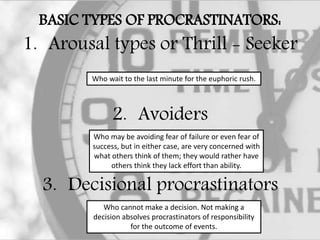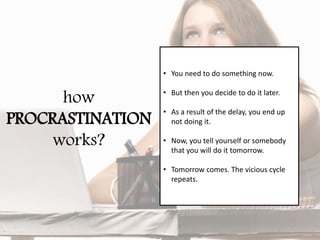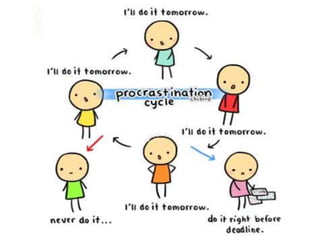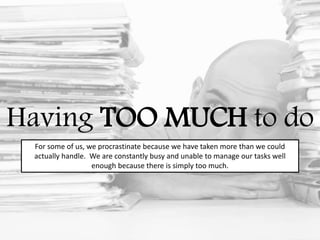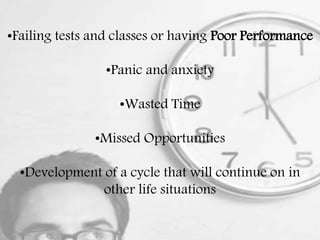Academic Procrastination
- 2. Procrastination is the avoidance of doing a task which needs to be accomplished. This can lead to feelings of guilt, inadequacy, depression and self-doubt among students. Procrastination has a high potential for painful consequences. It interferes with the academic and personal success of students.
- 3. “PROCRASTINARE “ pro – forward motion crastinus – belonging to tomorrow To “put off or postpone until another day”
- 4. Procrastination, by definition, is putting off for a later time what can be done today. The Filipino way of saying it is “saka na lang” which is clearly the mañana habit we inherited from our conqueror centuries ago. In reality, procrastination is a thief of time. Time is the only asset in this world that all of us can lose and never regain. By procrastinating, a person is in effect wasting and killing this very wonderful asset. Unfortunately, by the time he realizes this fact, he has already run out of time. He might try not to give up by saying “bahala na” and hope there will be a “later.” The problem is ‘later’ usually ends up as “never.”
- 6. Everyone procrastinates BUT not everyone is a PROCRASTINATOR Everyone procrastinates sometimes, but 20 percent of people chronically avoid difficult tasks and deliberately look for distractions—which, unfortunately, are increasingly available. Procrastination in large part reflects our perennial struggle with self-control as well as our inability to accurately predict how we'll feel tomorrow, or the next day.
- 7. BASIC TYPES OF PROCRASTINATORS: 1. Arousal types or Thrill - Seeker 2. Avoiders 3. Decisional procrastinators Who wait to the last minute for the euphoric rush. Who may be avoiding fear of failure or even fear of success, but in either case, are very concerned with what others think of them; they would rather have others think they lack effort than ability. Who cannot make a decision. Not making a decision absolves procrastinators of responsibility for the outcome of events.
- 8. how PROCRASTINATION works? • You need to do something now. • But then you decide to do it later. • As a result of the delay, you end up not doing it. • Now, you tell yourself or somebody that you will do it tomorrow. • Tomorrow comes. The vicious cycle repeats.
- 11. Fear of FAILUREWhen we are too afraid of failing, we tend to avoid what we perceive as difficult tasks. We are already defeated by the overwhelming feelings brought about by our evaluation of the task at hand. Because of a fear of failing and because of we predict others may think of us in a result, we often procrastinate or don’t do things at all.
- 12. PERFECTIONISM This is often accompanied by the earlier reason, and is ruled by unreasonably high and rigid standards. It can be tempting to put things off, or delay completing tasks simply because you’re worried that the result of your work is going to be less than perfect.
- 13. LAST MINUTE workers Some prefer the burst of productivity when there is pressure to finish something quick. These people typically slack off when there is still time and work very hard when they are panicking at the last minute. They are thrill seekers who feel good about themselves when they know they finished a difficult task in such a short time. Some people always procrastinate as they simply love the adrenaline rushing in their veins once they have to meet all the deadlines at the same time.
- 14. Lack of INTEREST Some people procrastinate because they are simply uninterested in the task at hand. This reason warrants digging for more reasons beyond simple lack of interest.
- 15. Having TOO MUCH to do For some of us, we procrastinate because we have taken more than we could actually handle. We are constantly busy and unable to manage our tasks well enough because there is simply too much.
- 17. •Failing tests and classes or having Poor Performance •Panic and anxiety •Wasted Time •Missed Opportunities •Development of a cycle that will continue on in other life situations
- 19. 1.Recognize You Have a Problem 2.Figure Out Why You Are Procrastinating 3.Get Organized 4. Identify Your Frog 5.Break Task Into Smaller Parts 6.Eliminate Distractions 7.Do Not Expect Perfection 8.Get a Support Team 9.Get Started 10.Reward Yourself
- 21. Peace of mind, a feeling of strength and purpose, and a healthy feeling of being in charge of your life. While procrastination makes you feel weak, useless, and helpless. You will experience increased personal freedom.
- 22. Resources: Pychyl, t.a., and flett, g.l. (2012). procrastination and self-regulatory failure: An introduction to the special issue. journal of rational-emotive and cognitive-behavior therapy. DOI: 10.1007/s10942-012-0149-5 http://www.brianrlittle.com/topics/research/personal-projects-analysis/ http://www.counselling.cam.ac.uk/selfhelp/leaflets/procrastination http://www.mentalhealth.ualberta.ca/en/~/media/mentalhealth/docs/hintsprocrastination 2012.pdf http://www.procrastination.ca http://httpserver.carleton.ca/~tpychyl/PYCHYL%20procrastination%20presentation%20m arch%2019%202012.pdf http://www.watchwellcast.com/ http://www.slideshare.net/readysetpresent/procrastination-powerpoint?qid=0b859e51- 9808-428d-b6dc-76ef74cb018b&v=&b=&from_search=27 http://www.slideshare.net/UNMESS/why-people-procrastinate-and-how-to-stop-doing- it?qid=0b859e51-9808-428d-b6dc-76ef74cb018b&v=&b=&from_search=38 http://www.slideshare.net/hilaryfinch/procrastination-powerpoint- 29983844?qid=a88387d7-2f03-4634-9b57-c6dac2f63df7&v=&b=&from_search=8 http://www.slideshare.net/Bearkits/overcome-procrastination-16674534?qid=a88387d7- 2f03-4634-9b57-c6dac2f63df7&v=&b=&from_search=18 http://www.slideshare.net/LauraTRich/procrastination-10823760?qid=a88387d7-2f03- 4634-9b57-c6dac2f63df7&v=&b=&from_search=56
Editor's Notes
- Procrastinating is done by people who have difficulty becoming motivated in accomplishing their tasks, trying to avoid working on projects, and cramming until the last minute. Those who procrastinate prefer to do enjoyable activities that suit their current moods, such as playing, using social media, and anything else that makes them refrain to do something “relevant” or needed. Simply put, they put off important tasks to do other less important ones. (Bernard, 2015)
- Recognize You Have a Problem You must first become aware that you have a problem in procrastinating. You know you are procrastinating when: You fill your “To Do” list with unimportant tasks You decide to do something else that you consider fun instead of working on the task (ex. Facebook, X-box, iPod, texting) You keep putting important task for the next day and next You easily say “yes” to anything that takes you away from your work Figure Out Why You Are Procrastinating Ask yourself why you are procrastinating: Is it because it is boring and unpleasant? Is it because it is too difficult? Is it because you are disorganized? Is it because you are overwhelmed by the task? Is it because you are a perfectionist? Is it because you do not know which task to do first? Once you discover what your reasons are to procrastinate, then you can develop an action plan with anti-procrastination strategies. Get Organized Make a “To Do” List on what needs to be done and when it needs to be done. Allow time to complete things and set time aside for the unexpected. Prioritize the list on what needs to be done first. Set reasonable goals and deadlines for each goal. Once you complete a task, check it off. You will feel great in getting it done! Identify Your Frog Your “frog” should be the most difficult task on your “To Do” list and the one you are most likely to procrastinate on. Break Task Into Smaller Parts If a task seems too much or too overwhelming, break it into smaller and manageable tasks. Tasks can be broken into minutes, hours, or days. By completing these small tasks, you will get a feeling that you are achieving things which will give you momentum to complete more tasks. Eliminate Distractions You may be putting things off because you are easily distracted by your cell phone, Facebook, friends, iPod, X-box, etc. To get things done and stay focused, get rid of the distractions around you. If necessary, turn them OFF! Do Not Expect Perfection Perfectionism is one of the biggest reasons for procrastination. Do not wait for the perfect time to start because it will just prolong procrastination. Also, do not expect perfection. No one is perfect. It is better to try your best than do nothing at all! Get a Support Team Tell your friends and parents to check up on you or to remind you of your priorities and deadlines.Tell them to hold you accountable for your goals and deadlines. Get Started Going from doing nothing to doing something is often the hardest part. Therefore, get a grip and just do it. Dive in and TAKE ACTION! It takes about 15 minutes after starting to become engaged. Once you have reached this level of engagement, you will see that it will be hard to stop. Reward Yourself After reaching mini goals or deadlines, reward yourself with a break, a movie, or some kind of treat as you continue towards your ultimate goal. These little incentives will give you more energy to keep on going.


